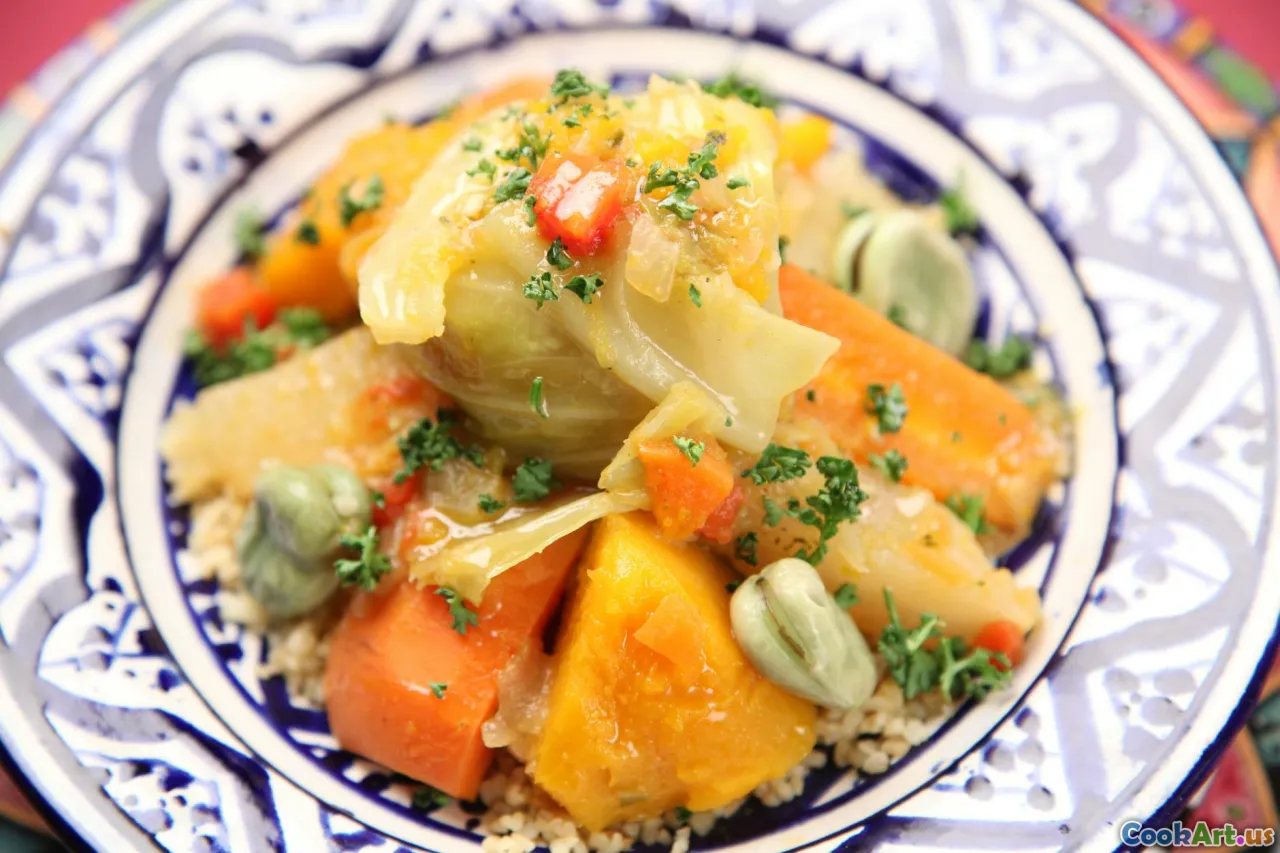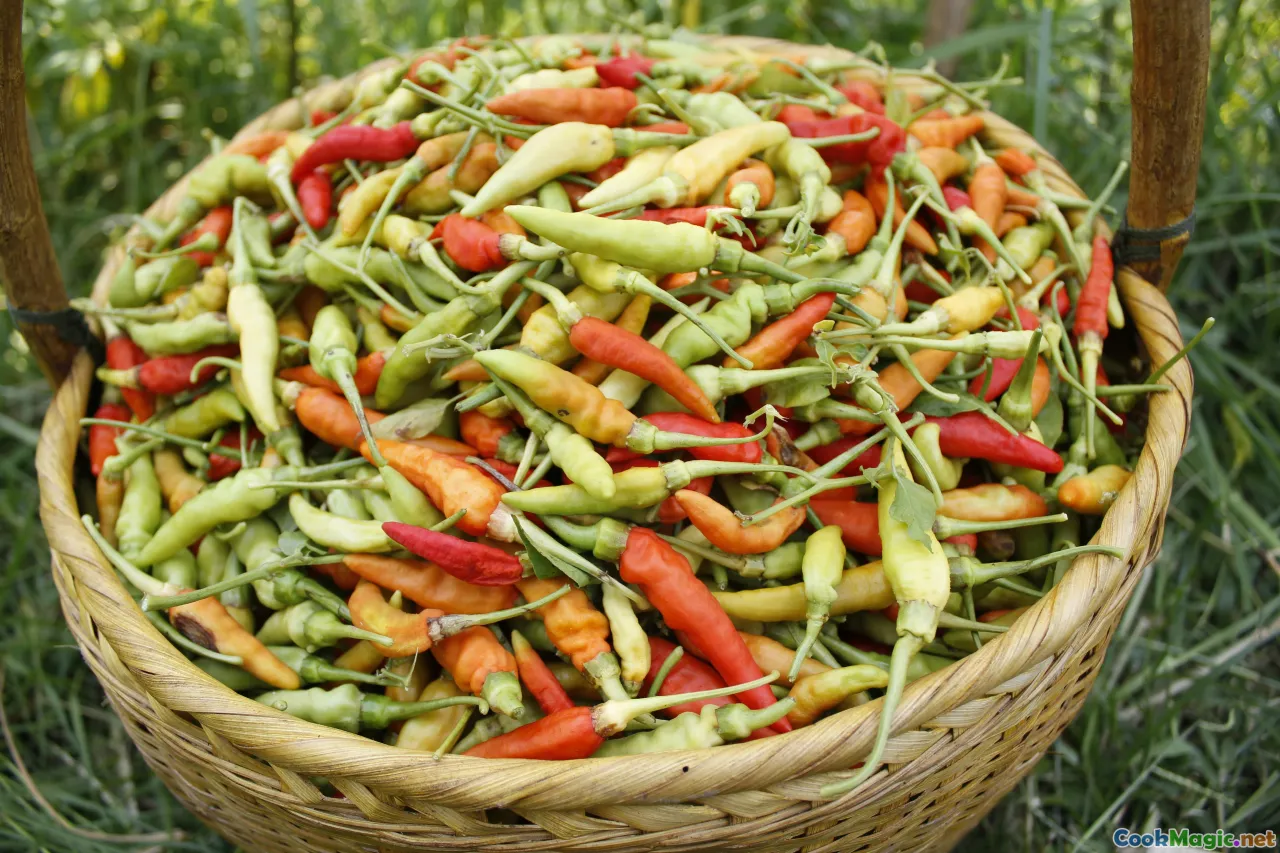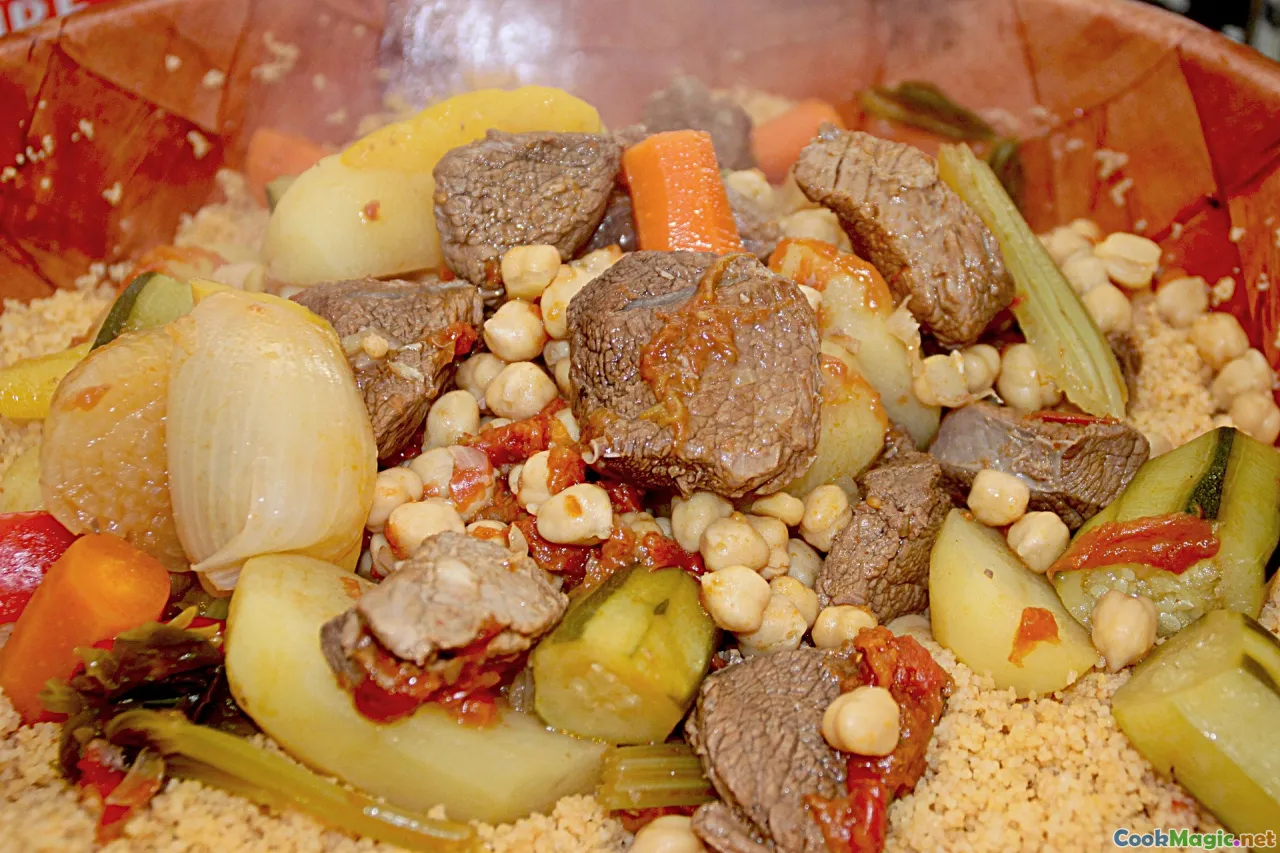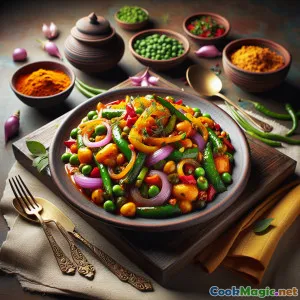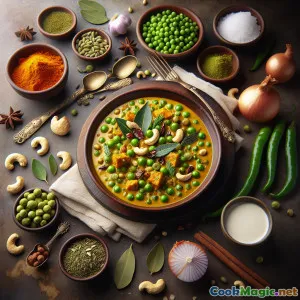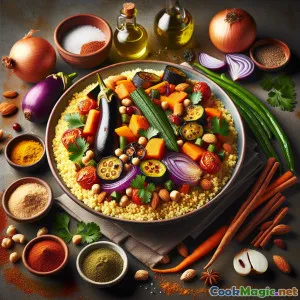
Sahel-Style Gemüse-Couscous Mboum Genuss
(Sahel-Style Vegetable Couscous Mboum Delight)
(0 Bewertungen)0
1,915
August 31, 2025
Problem melden
Zutaten
-
250 grams Mittelkorn-Couscous
(Uncooked)
-
150 grams Okra
(In Scheiben geschnitten)
-
1 medium-sized Aubergine
(Gewürfelt)
-
2 medium Karotten
(Cut into small sticks)
-
180 grams Butternut-Kürbis
( geschält und gewürfelt)
-
1 large Rote Zwiebel
(In Scheiben geschnitten)
-
2 pieces Knoblauchzehen
(Fein gehackt)
-
2 tablespoons Tomatenmark
(Preferably double-concentrated for richer flavor)
-
2 medium Frische Tomaten
(Hacken)
-
1 teaspoon Gemahlener Koriander
-
1 teaspoon Gemahlener Kreuzkümmel
-
1/2 teaspoon Gemahlener Ingwer
-
1 piece Zimtstange
-
6 pieces Getrocknete Aprikosen
(In Scheiben geschnitten)
-
200 grams Kichererbsen
(Pre-cooked or canned, drained)
-
30 grams Geröstete Mandelblättchen
(Toasted)
-
750 ml Gemüsebrühe
(Natriumarm bevorzugt)
-
3 tablespoons Olivenöl
-
1 teaspoon Kashersalz
(Nach Geschmack anpassen)
-
1/2 teaspoon Schwarzer Pfeffer
(Frisch gemahlen, nach Geschmack)
-
2 tablespoons Frischer Koriander (Kräuter)
(Grob gehackt, zum Garnieren)
(Uncooked)
(In Scheiben geschnitten)
(Gewürfelt)
(Cut into small sticks)
( geschält und gewürfelt)
(In Scheiben geschnitten)
(Fein gehackt)
(Preferably double-concentrated for richer flavor)
(Hacken)
(In Scheiben geschnitten)
(Pre-cooked or canned, drained)
(Toasted)
(Natriumarm bevorzugt)
(Nach Geschmack anpassen)
(Frisch gemahlen, nach Geschmack)
(Grob gehackt, zum Garnieren)
Nährwerte
- Portionen: 4
- Portionsgröße: 1 Schüssel (ca. 250 g)
- Calories: 470 kcal
- Carbohydrates: 82 g
- Protein: 16 g
- Fat: 9 g
- Fiber: 13 g
- Sugar: 14 g
- Sodium: 790 mg
- Cholesterol: 0 mg
- Calcium: 100 mg
- Iron: 4.1 mg
Anweisungen
-
1 - Prepare Vegetables:
Rinse and chop all vegetables as directed. Keep them separated according to type for even cooking times.
-
2 - Sauté Aromatics:
Heat olive oil in a large pot over medium heat. Add red onion and garlic, cooking until softened and fragrant.
-
3 - Add Tomato & Spices:
Stir in tomato paste, fresh tomatoes, ground coriander, cumin, and (if using) ground ginger and cinnamon stick. Cook until the tomatoes soften.
-
4 - Simmer the Stew Base:
Pour in vegetable stock and bring to a boil. Add carrot, eggplant, and butternut squash. Cover and simmer 10 minutes.
-
5 - Add Rest of Vegetables & Chickpeas:
Add okra, chickpeas, and dried apricots (if using). Continue simmering until all vegetables are tender.
-
6 - Steam the Couscous:
Place couscous in a bowl, season lightly. Pour over 400 ml boiling water from the stock. Cover, let stand for 5 minutes, then fluff with fork.
-
7 - Toast Almonds:
In a dry pan, toast almonds until golden brown. Reserve for serving (optional).
-
8 - Plate and Garnish:
Arrange fluffy couscous on plates or in a communal bowl. Top with savory vegetable stew. Garnish with toasted almonds and fresh coriander.
Rinse and chop all vegetables as directed. Keep them separated according to type for even cooking times.
Heat olive oil in a large pot over medium heat. Add red onion and garlic, cooking until softened and fragrant.
Stir in tomato paste, fresh tomatoes, ground coriander, cumin, and (if using) ground ginger and cinnamon stick. Cook until the tomatoes soften.
Pour in vegetable stock and bring to a boil. Add carrot, eggplant, and butternut squash. Cover and simmer 10 minutes.
Add okra, chickpeas, and dried apricots (if using). Continue simmering until all vegetables are tender.
Place couscous in a bowl, season lightly. Pour over 400 ml boiling water from the stock. Cover, let stand for 5 minutes, then fluff with fork.
In a dry pan, toast almonds until golden brown. Reserve for serving (optional).
Arrange fluffy couscous on plates or in a communal bowl. Top with savory vegetable stew. Garnish with toasted almonds and fresh coriander.
Mehr über: Sahel-Style Gemüse-Couscous Mboum Genuss
Couscous Mboum aux Légumes du Sahel
Couscous Mboum aux Légumes du Sahel is an imaginative and heartfelt homage to the culinary richness of the Sahel region—a vast swath across West Africa that endures harsh climates but remains abundant in both agricultural innovation and human resilience. Notably, "Mboum" is inspired by traditional Fulani and Sahelian dishes where cereals are enriched with an assortment of vibrant, sun-nourished vegetables and robust spices. This version melds the comforting body of couscous with a medley of regional delights including okra, eggplant, and butternut squash, evoking memories of communal meals in rural Africa and connecting distant cultures through simple, nourishing food.
Historical Roots & Cultural Connections
Couscous itself is originally North African by heritage (especially from Maghrebi countries like Morocco, Algeria, and Tunisia), but its popularity has spread throughout the African continent and beyond. In the Sahel, local adaptation abounds—influencing the use of cereal grains like millet, sorghum, or maize, sometimes substituting classic durum wheat couscous. Here, we're keeping the familiar wheat couscous for culinary accessibility, though true Mboum often signals ground millet. Légumes du Sahel—literally "vegetables from the Sahel"—suggests flexibility; cooks use produce adapted to seasonal kismet: okra, eggplants, root vegetables, and leafy greens.
Preparation and serving carries deep significance. Dishes like this are often enjoyed in large communal bowls, shared at bustling marketplaces, after Friday prayers, or to welcome travelers. Common use of chickpeas—not indigenous but now ever-present—creates an additional nutritional cornerstone, fortifying the stew-like base. Though the Sahel is challenged by drought and shifting landscapes, the proud reliance on legumes, pulses, and drought-resistant vegetables is reflected in such dishes, forging powerful ties to the land and community identity.
Unique Aspects & Why You'll Love It
This dish threads the line between the comforting, fluffy grains of couscous and the intense, earthy aromas of a slow-cooked vegetable ragout. The pronounced perfume of cumin and coriander, complemented by the optional warmth of ginger and cinnamon, evokes a pan-African embrace that stretches from street markets in Ouagadougou to dinner tables in contemporary European cities.
What makes this recipe stand out are the layers of texture and harmony. Okra brings an inviting silkiness; eggplant absorbs the deep tomato-spice sauce; sweet dried apricots offer the occasional sunny burst (or can be omitted for a purely savory palate), and toasted almonds lend a pleasant crunch on the finish. Using vegetable stock keeps the base light and uplifting—important for balancing strong flavors and for a modern, holistic take on comfort food.
Tips & Notes
- Vegetable Power: Don’t feel tied to the listed produce—a successful Mboum is often a celebration of what’s currently ripe and available. Sweet potatoes or leafy greens make excellent additions or substitutes.
- Spice Tweaks: Adjust spices according to region or taste. Ras el hanout offers a Maghreb note, while local additions like Berbere or African grains of paradise can deepen authenticity.
- Protein Optionality: This recipe is plant-based, but chicken, lamb, or dried fish are often found in the Sahelian versions for celebratory occasions.
- Meal, Family, Memory: Lamb this at the center of a communal table, with plenty of fresh mint tea; a complete experience is guaranteed.
Final Thoughts
Cooking Couscous Mboum aux Légumes du Sahel isn’t solely an exercise in flavor but an invitation to experience the resilience, warmth, and inventiveness of Sahelian home cooking. Its adaptability—intrinsic to its origins—helps it flourish across kitchens and continents, nourishing both body and soul, daring us to create, improvise, and share. Whether you’re cooking for just a couple or a merry company, you’ll taste not only the vegetables and spices but generations of tradition and togetherness sustaining deserts and cities alike.

